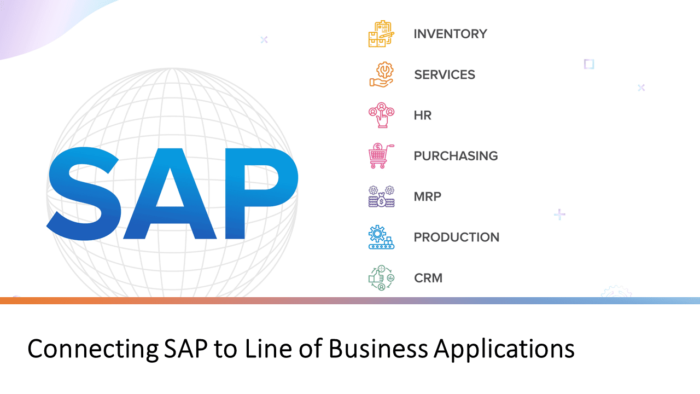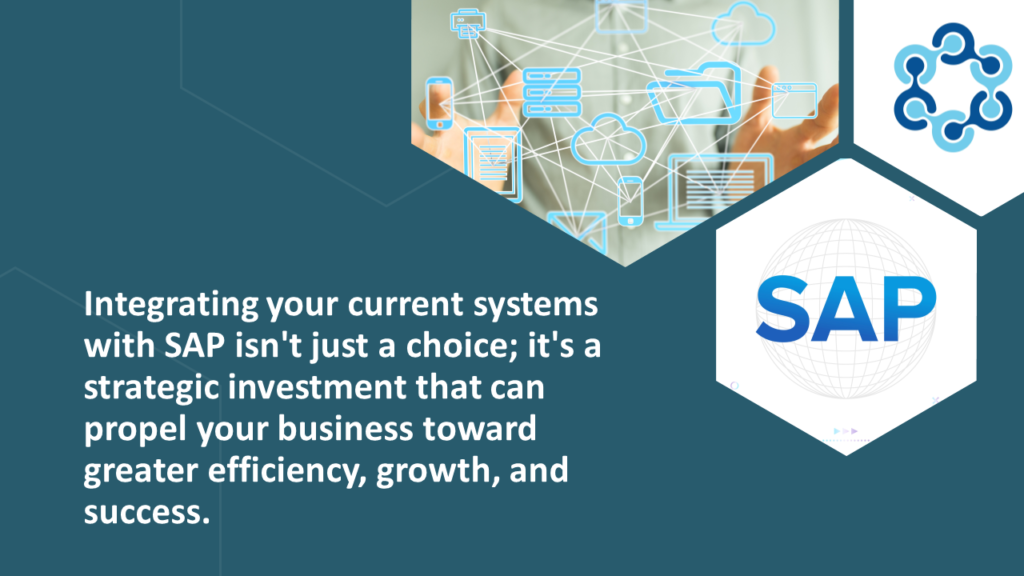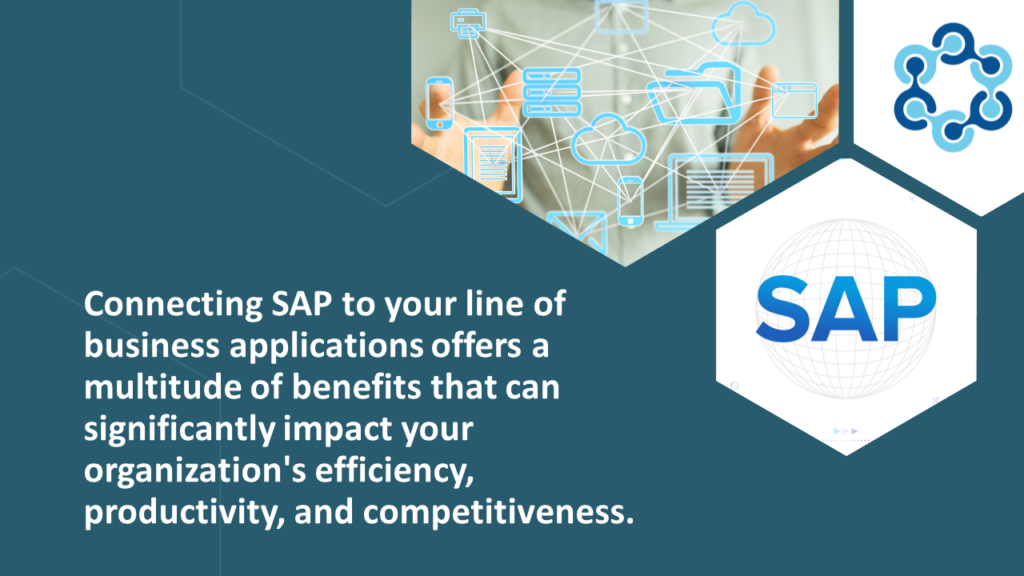Connecting SAP to Your Line of Business Applications
In the ever-evolving landscape of business technology, streamlining operations and optimizing efficiency is paramount. One way to achieve this is by connecting your SAP system with your line of business applications. It can not only streamline processes, increase efficiency, and enhance data accuracy, but also lead to improved productivity and cost savings. SAP’s robust analytics and reporting capabilities enable data-driven decision-making, providing a competitive advantage and facilitating better insights into your organization’s performance. Let’s have a better understanding of SAP and how SAP integrations can transform your business applications.
What is SAP?
SAP, which stands for Systems, Applications, and Products in Data Processing, is a powerhouse in enterprise resource planning (ERP) software. It’s like the digital backbone of many organizations, helping manage a multitude of business operations, from finance and HR to supply chain and customer relationship management.
SAP’s software is used by a wide range of businesses and organizations around the world, from small and medium-sized enterprises to large multinational corporations. It plays a crucial role in helping companies manage their operations efficiently, improve productivity, and adapt to changing business environments.
Why should you connect your current systems with SAP?
Connecting your current systems with SAP is a strategic move that can significantly elevate your business operations. In today’s fast-paced and data-driven business environment, seamless integration is key to staying competitive and efficient. SAP’s comprehensive suite of software solutions can help break down data silos, enabling various departments to work harmoniously. This not only streamlines processes and reduces manual data entry but also improves data accuracy and consistency.
With SAP’s powerful analytics and reporting tools, you can gain deeper insights into your business performance, allowing for more informed decision-making. Moreover, integration with SAP opens the door to scalability, adaptability, and staying in compliance with evolving industry standards and regulations. In essence, integrating your current systems with SAP isn’t just a choice; it’s a strategic investment that can propel your business toward greater efficiency, growth, and success in the digital age.
Let’s take a look at some common SAP integrations:
Customer Relationship Management (CRM) Systems
Integrating SAP with CRM systems like Salesforce or Microsoft Dynamics allows organizations to have a unified view of customer data, enabling better customer service and sales management.
Enterprise Content Management (ECM) Systems
Integrating with ECM platforms like SharePoint or OpenText enables efficient document and content management, making it easier to access, store, and manage documents within SAP.
Supply Chain Management (SCM) Systems
Integration with SCM solutions such as Oracle SCM Cloud or JDA Software helps optimize supply chain processes, improving inventory management, demand forecasting, and logistics.
Human Resources (HR) Management Systems
Integrating SAP with HR systems like Workday or Oracle HCM Cloud allows for seamless management of employee data, payroll, and workforce planning.
Business Intelligence (BI) and Analytics Tools
Integration with BI tools like Power BI, Tableau, QlikView, or SAP BusinessObjects enhances reporting and data analysis capabilities, providing real-time insights and data visualization.
E-commerce Platforms
Integration with e-commerce platforms like Magento or Shopify enables organizations to manage online sales, inventory, and customer data more efficiently.
IoT (Internet of Things) Devices
SAP can be integrated with IoT devices and platforms to collect and analyze data from sensors, machines, and equipment, facilitating predictive maintenance and process optimization.
Financial and Accounting Software
Integrating with financial systems like QuickBooks or Oracle Financials allows for better financial data management, budgeting, and financial reporting.
Warehouse Management Systems (WMS)
Integration with WMS solutions streamlines inventory tracking, order fulfillment, and warehouse operations, ensuring accuracy and efficiency.
Procurement and Vendor Management
Integrating with procurement systems like Ariba or Coupa helps automate procurement processes, manage vendor relationships, and control spending.
EDI (Electronic Data Interchange) Systems
Integration with EDI systems enables automated exchange of business documents, such as purchase orders and invoices, with trading partners.
Mobile Applications
Developing mobile apps that integrate with SAP can empower employees to access critical data and perform tasks on the go, enhancing productivity and decision-making.
Legacy Systems
Integration with legacy systems may be necessary to ensure a smooth transition to SAP while preserving existing data and processes.
Data Integration Platforms
Using middleware solutions like MuleSoft or SAP PI/PO (Process Integration/Process Orchestration) to facilitate data flow between SAP and other systems.
Geographical Information Systems (GIS)
Integrating SAP with GIS systems allows organizations to incorporate location-based data and mapping capabilities into their business processes.
These are just a few examples of common SAP integrations. The specific integrations an organization chooses will depend on its business needs, industry, and goals. Successful integrations can significantly enhance the efficiency and effectiveness of SAP-based operations. However, these integrations somehow help the businesses to grow better by making their operations simple and accessible.
Benefits of Connecting SAP to Your Line of Business Applications
Connecting SAP to your line of business applications offers a multitude of benefits that can significantly impact your organization’s efficiency, productivity, and competitiveness. Here are some of the key advantages:
Improved Efficiency
Integration streamlines business processes by automating data exchange between SAP and your line of business applications. This reduces manual data entry, minimizes errors, and accelerates workflows, resulting in faster and more efficient operations.
Enhanced Data Accuracy
Data accuracy is critical for informed decision-making. Integrating SAP with other systems ensures that data is consistent and up-to-date across all platforms, reducing the risk of errors caused by data discrepancies.
Streamlined Processes
Integration breaks down data silos between different departments, enabling seamless communication and collaboration. Teams can access relevant information in real-time, which leads to faster decision-making and improved cross-functional coordination.
Real-time Insights
With integrated systems, you gain access to real-time data and analytics. This empowers your organization to make informed decisions on the spot, identify trends as they emerge, and respond to changing market conditions promptly.
Cost Reduction
Automation and improved efficiency result in reduced operational costs. You’ll save time and resources previously spent on manual data entry and reconciliation, as well as minimize the risk of costly errors.
Better Customer Service
Integration enhances the customer experience by providing your customer-facing teams with immediate access to relevant customer data. This leads to quicker response times, personalized interactions, and improved customer satisfaction.
Competitive Advantage
In today’s fast-paced business environment, agility and responsiveness are paramount. Integrated systems allow you to adapt quickly to market changes, stay ahead of competitors, and seize new opportunities.
Data Consistency
Integration ensures that all systems use consistent and accurate data. This reduces the likelihood of data discrepancies and inconsistencies that can lead to confusion and errors in decision-making.
Scalability
As your business grows, integrated systems can easily scale with you. You can add new applications and expand functionality without the need for a complete overhaul, saving time and resources.
Compliance and Security
Many industries have strict regulatory requirements for data handling and security. Integration solutions can help ensure that your data remains compliant with industry standards and regulations, reducing the risk of non-compliance penalties.
Efficient Reporting
Integrated systems simplify the reporting process. You can generate comprehensive reports and analytics with ease, providing valuable insights for strategic planning and compliance reporting.
Customized Solutions
Integration can be tailored to your specific business needs. Whether you need to connect SAP with CRM, ERP, e-commerce, or other applications, you can customize the integration to align with your unique requirements.
Connecting SAP to your line of business applications is a strategic move that offers a wide array of benefits, including improved efficiency, data accuracy, streamlined processes, real-time insights, cost reduction, and enhanced customer service. It positions your organization for growth, competitive advantage, and adaptability in an ever-evolving business landscape.
Why It’s Important to Have a Vendor Like i3solutions
While the benefits of SAP integration are clear, the process can be complex. Here is where having a trusted partner like i3solutions comes into play. Here are some key reasons why you should consider our expertise:
Experience Matters
i3solutions brings a wealth of experience to the table. With over 25 years of successful integration projects under our belt, we understand the intricacies of connecting SAP to various line of business applications.
Tailored Solutions
Not all businesses are the same, and neither are their integration needs. i3solutions works closely with you to develop a tailored integration strategy that aligns with your unique business goals and requirements.
Minimized Disruption
Integrating systems can be a disruptive process if not handled carefully. i3solutions employs best practices and a well-thought-out approach to minimize disruptions to your day-to-day operations.
Ongoing Support
The journey doesn’t end with integration. i3solutions can provide ongoing support and maintenance to ensure your systems continue to function smoothly.
Compliance and Security
Data security and compliance are top priorities. i3solutions ensures that your integrated systems meet industry standards and regulatory requirements, safeguarding your sensitive information.
i3solutions is not just another vendor; we are a trusted partner with a proven track record. Our extensive integration experience spans across industries, and we have successfully connected SAP with various line of business applications, including but not limited to:
- Salesforce – Integrating SAP with Salesforce improves sales and customer service processes, providing a 360-degree view of customer interactions.
- Oracle E-Business Suite – This integration streamlines financial and supply chain processes, enabling better control and visibility.
- Microsoft Dynamics 365 –Integrating SAP with Dynamics 365 enhances marketing, sales, and customer service functionalities.
- Shopify – For e-commerce businesses, connecting SAP with Shopify ensures accurate inventory management and order processing.
- Tableau – Integrating SAP with Tableau enables powerful data visualization and analytics, facilitating data-driven decision-making.
Connecting SAP to your line of business applications is not just a tech trend; it’s a strategic move that can drive your business forward. The benefits are clear: improved efficiency, enhanced data accuracy, streamlined processes, real-time insights, and cost reduction. And when you partner with experts like i3solutions, you’re not just integrating systems; you are future-proofing your business for success. So, take the leap into the world of SAP integration and reach out to i3solutions to guide you on this transformative journey.
Leave a Comment




